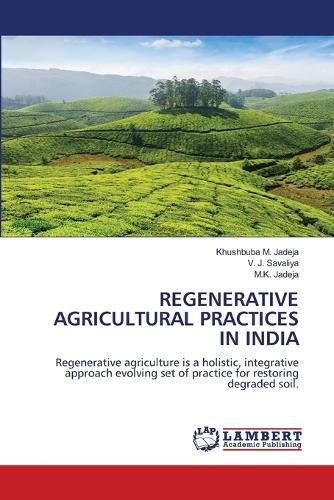Readings Newsletter
Become a Readings Member to make your shopping experience even easier.
Sign in or sign up for free!
You’re not far away from qualifying for FREE standard shipping within Australia
You’ve qualified for FREE standard shipping within Australia
The cart is loading…






Regenerative agriculture is the process of restoring degraded soils using practices (e.g., adaptive grazing, no-till planting, no or limited use of pesticides and synthetic fertilizer, etc.) based on ecological principles. These principles guide a set of practices that farmers can adapt to their specific environmental and cultural contexts. The core principles are minimizing soil disturbance, maintaining soil cover, maximizing crop diversity, integrating livestock, building soil fertility naturally, enhancing water management, promoting ecosystem health and community and economic resilience. And these principles can be obtained through key practices like zero tillage, reduced tillage, cover cropping, mulching, crop diversification, crop rotation, natural farming, silvo-pasture, rotational grazing, organic farming, bio-fertilizer, bio-pesticides, drip irrigation, sprinkler irrigation, rain water harvesting, groundwater discharge, Integrated Farming System, agroforestry, climate resilient agriculture technologies, NICRA, etc.
$9.00 standard shipping within Australia
FREE standard shipping within Australia for orders over $100.00
Express & International shipping calculated at checkout
Regenerative agriculture is the process of restoring degraded soils using practices (e.g., adaptive grazing, no-till planting, no or limited use of pesticides and synthetic fertilizer, etc.) based on ecological principles. These principles guide a set of practices that farmers can adapt to their specific environmental and cultural contexts. The core principles are minimizing soil disturbance, maintaining soil cover, maximizing crop diversity, integrating livestock, building soil fertility naturally, enhancing water management, promoting ecosystem health and community and economic resilience. And these principles can be obtained through key practices like zero tillage, reduced tillage, cover cropping, mulching, crop diversification, crop rotation, natural farming, silvo-pasture, rotational grazing, organic farming, bio-fertilizer, bio-pesticides, drip irrigation, sprinkler irrigation, rain water harvesting, groundwater discharge, Integrated Farming System, agroforestry, climate resilient agriculture technologies, NICRA, etc.